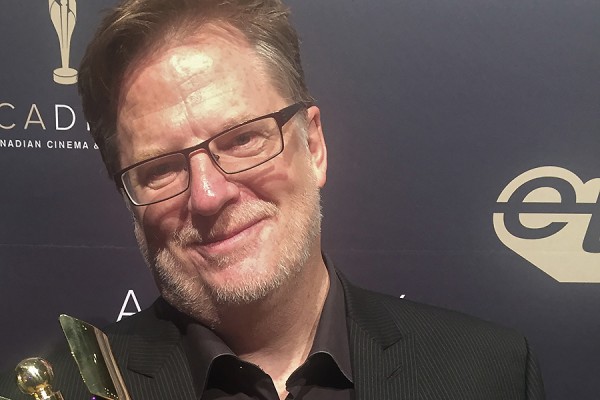 Film professor Nick Hector’s editing work on the documentary “Prey” is nominated for three national awards.
Film professor Nick Hector’s editing work on the documentary “Prey” is nominated for three national awards.
A University of Windsor film professor’s most recent professional work has been nominated for the ‘trifecta’ -- Best Editing in a Documentary Feature for Prey — by all three Canadian film bodies.
“Nick Hector has achieved a very rare standing this month,” says Vincent Georgie, director of the School of Creative Arts (SoCA) and executive director of the Windsor International Film Festival (WIFF). “His work on Prey has received nominations for him at all three of the highest film industry bodies: Canadian Cinema Editors (CCE), Directors Guild of Canada (DGC) and the Canadian Screen Awards (CSA). I can count on two hands how many times this has happened ever in Canadian cinema.”
Prof. Hector describes himself as a film editor, story editor, and producer with more than 30 years of experience. He has cut more than 150 documentary films and programs in editing rooms across the globe. He has been nominated for 33 national film awards and the winner of 12, including CSA, HotDocs, DGC, CCE, and Gemini Awards.
Hector joined SoCA’s film faculty in 2018. He teaches editing to third- and fourth-year film students and MFA students of film and media arts, and a first-year time-based media course in the visual arts program.
“Prey is the fourth film that Nick has edited for me,” says Matt Gallagher, filmmaker and UWindsor alumnus. “Nick is a gifted storyteller who has helped me find my voice.”
“The critical success of this project proved to me that I can do good work at the university,” says Nick Hector. “I work in a very supportive and nurturing environment.”
When Hector first engaged in this project, he had some concerns about whether he would be supported by the university. This project deals with delicate subject matter and he didn’t want to blindside the university. There were some concerns because part of this film takes place at what is now a building owned by the university.
“I received a reaction like I’d never imagined,” says Hector. “It was, ‘that’s wonderful’. Vincent Georgie was fantastic. Not only supportive in terms of me pursuing this as a research endeavour, but asking what resources I needed. Do you need studios? How about students? What can we do to make this happen? And when it comes time for the [Windsor International] Film Festival, let us know. We want to have a look at it.’ It was an extraordinary experience.”
A lot of people from UWindsor were involved in this production. Besides Gallagher, Hector also had the opportunity to hire students Alysha Baker as assistant editor, and production assistants Randi-Lyn Miller, Cri Kosti, and Steven Boere, who were an integral part of the team.
The Editing Process
Hector began his career in television journalism and soon specialized in long-form documentary, particularly cinéma-vérité. Probably his best-known work stems from his long creative relationship with legendary Canadian filmmaker Allan King.
“Working on that kind of film, it’s about selecting the right words and pictures. You’re starting with a blank canvas and you’re creating a drama out of bits of everyday life.
“This kind of film (Prey) it’s more like being a literary editor where your author hands you a 100,000 page first draft. Matt shot about 200 hours of film. So it’s a process of elimination, pulling things out and revealing the gem that’s in there.”
You must figure out what the narrative purpose is. As the story unfolds over time, what is important or key to telling the story may change. Matt Gallagher shot Prey over a two-year period following in real time the court case and appeal.
“It’s sort of this balancing act, but it’s all about figuring out what is the narrative thrust of each moment,” says Hector.
“We worked together on Prey in downtown Windsor,” explains Gallagher. “On one of my many breaks from the edit suite to grab a shawarma or a coffee, I’d come back to find that Nick had rescued some forgotten footage from the cutting room floor and crafted a scene that was magic. That’s what Nick does for my films — he finds art in the ordinary.”
When the director comes in to review the progress, “They have the benefit of not having done all that hard work [of selecting shots and segments],” explains Hector. “So, if they want to cut something, they aren’t aware of how long you worked at putting that segment together. They become the editor’s editor, if you will.”
“We had 99 per cent of it edited. The film was working, but we didn’t have a sense of the protagonist as a man, as a person. We saw him and his struggle but we didn’t bond with him,” says Hector. “So, Matt went out at the last minute and shot what is in fact the opening of the film in which Rod MacLeod visits the scene of the crime. And it’s quite emotional. The scene is quite terrific as a vehicle to foster bonding with the audience.
“I would say that constructing the emotional arc, how the film engages with you and triggers your emotions over time is the most significant challenge. To figure out the logic of the structure is the craft. Working out the emotional structure I see as the art of it.”
Prey won the Rogers Audience Award for Best Canadian Documentary and the Directors Guild of Canada Special Jury Prize for Best Canadian Feature Documentary at the 2019 Hot Docs Canadian International Documentary Festival.
—Susan McKee
